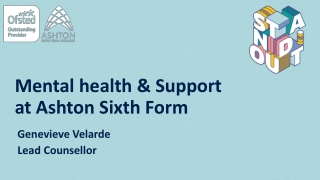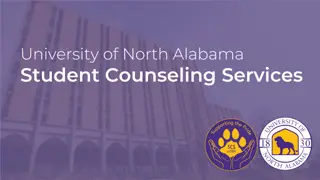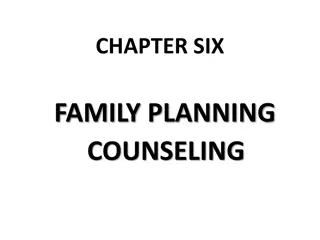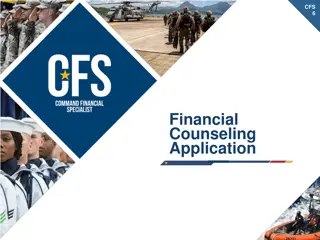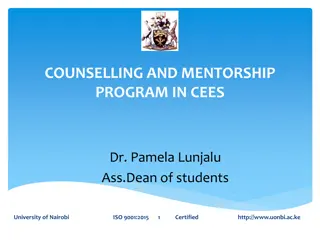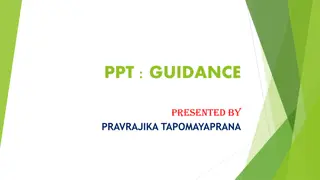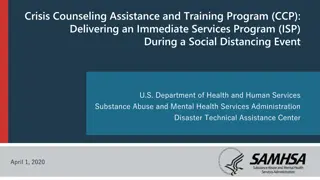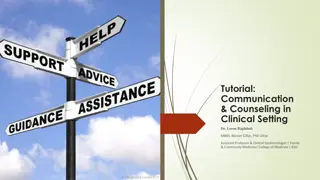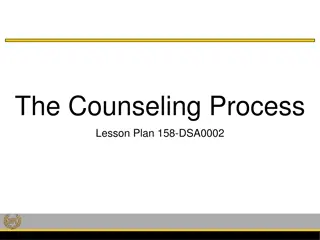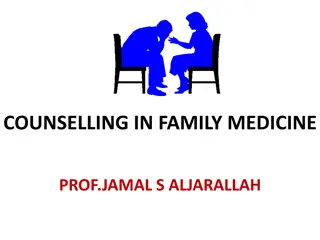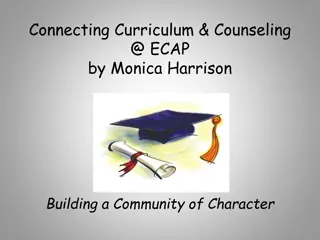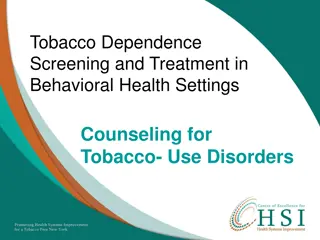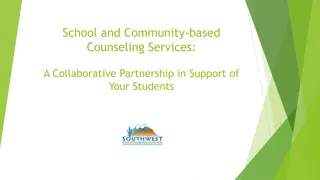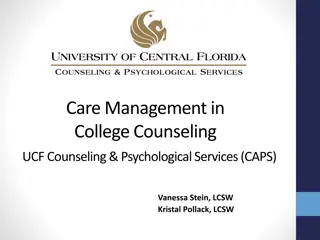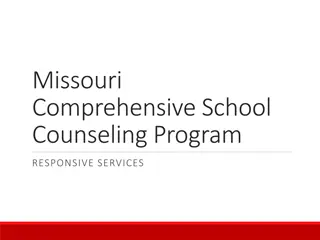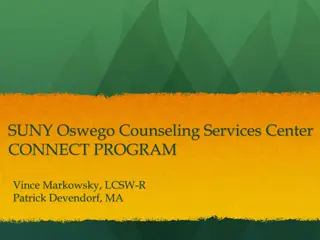Understanding Counseling for Support and Guidance
Explore the process of counseling, its benefits, making referrals, common experiences, and signs to watch for. Counseling helps clients make decisions, change behaviors, and improve overall well-being. Learn about the positive impact counseling can have on students' communication, confidence, and emotional management. Discover tips for offering support effectively and identifying potential red flags in individuals seeking help.
Download Presentation

Please find below an Image/Link to download the presentation.
The content on the website is provided AS IS for your information and personal use only. It may not be sold, licensed, or shared on other websites without obtaining consent from the author. Download presentation by click this link. If you encounter any issues during the download, it is possible that the publisher has removed the file from their server.
E N D
Presentation Transcript
Counseling Counseling & & Consultation Services Consultation Services 3405 CB Hedgcock 3405 CB Hedgcock
Counseling and Consultation Services Marie Aho, Ph.D. Cathy Greer Cole, LMSW Jean Kupper, LCSW Mary Etchison, Ph.D. Dody Huuki, Principal Secretary
What is Counseling Counseling is a process in which clients learn how to make decisions and formulate new ways of behaving, feeling, and thinking. Counselors focus on the goals their clients wish to achieve. Clients explore their present levels of functioning and the changes that must be made to achieve personal objectives. Thus, counseling involves both choice and change, evolving through distinct stages such as exploration, goal setting, and action (Brammer, 1993; Egan, 1990). Not advice but reflection, understanding and problem-solving Strictly Confidential Free
Benefits of Counseling Examples from students: improved communication and interpersonal skills greater self-acceptance and self-esteem ability to change self-defeating behaviors/habits better expression and management of emotions, including anger relief from depression, anxiety or other mental health conditions increased confidence and decision-making skills ability to manage stress effectively improved problem-solving and conflict resolution abilities -Hudson Valley Community College
Tips for making a referral Use your communication skills Take a non-judgmental approach Know NMU resources
What you might experience A student seeks you out over and over with the same problem(s) and does not seem to take any steps to improve his/her situation, except to come back to talk to you. A student continues to struggle despite his/her and your best efforts to address the concerns. You feel the urge to rescue the student from the pain/hurt he/she is feeling. A student contacts you over and over about another student. You want to solve the problem for the student. You are feeling helpless, trapped, or overwhelmed. The student is not making sense to you, i.e., has wild and bizarre behaviors Student makes grandiose, impossible plans
Continued Hears/sees things you don t hear/see Talks about excessive drug/alcohol use Talks about a history of problems Has no thoughts about their future Is withdrawn or isolates self Talks often about suicide or death Behaves as if he/she doesn t belong Is overly controlling
What To Do Show your care and concern Ask direct questions, but do not probe Remain calm Ask for help Do not provide a diagnosis When referring to the Counseling Center, help the student make the connection Counselors have to abide by strict confidentiality laws Follow up with the student to see if he/she followed through with the referral.
Referrals Non Urgent Explain the services provided by the Counseling Center Normalize the need for support Help the student think about how he or she may benefit from counseling Provide contact information: 3405 CB Hedgcock (906-227-2980) Offer to help the student make an appointment Offer to walk the student to the Counseling Center Follow-up with the student, not the counselor, as Counseling Center services are confidential
Crisis Referrals During Business Hours If you believe there is an imminent threat of harm to self, or the student is violent or threatening, this is an emergency. Please take immediate action by calling Public Safety at 227-2151 or 911 For an emotional crisis, if possible, walk the student to the Counseling Center or Call Public Safety for assistance If possible, call the Counseling Center to alert us of your arrival 906-227-2980 A counselor is available to see a student in an emotional crisis It is best not to leave the student alone; however, never hold a student against his or her will
Emergency Situations In the event of a potential life threatening emergency situation, call Public Safety for immediate assistance: 227-2151 or call 911 You can also utilize the blue light call boxes located throughout campus to contact Public Safety
Counseling Center Basics The student is the one who is required to make the appointment How the student would make an appointment: Call (906) 227-2980 Come to the Counseling Center to fill out initial paperwork Counseling Center Hours: 8:00-5:00 Monday Friday Summer Hours: 7:30-4:00 Monday Friday Check out our website at http://web.nmu.edu/counseling/
Counseling & Consultation Services Counseling for students only Consultation for the entire NMU community about issues of concern: departments, organizations, faculty and staff, students, residence life staff, etc. Referrals to Community Providers Outreach Presentations Some content courtesy of Cicely Horsham-Brathwaite, Ph.D.


